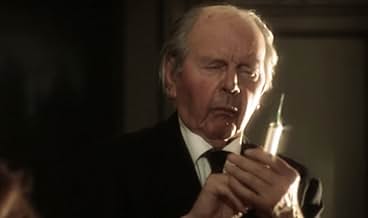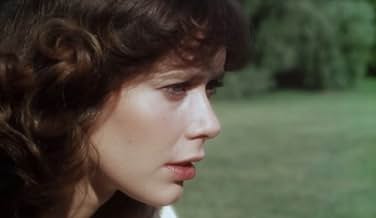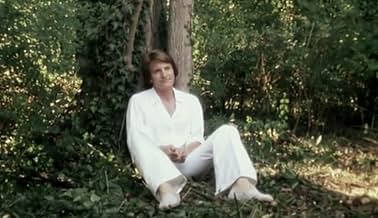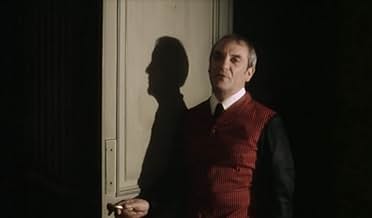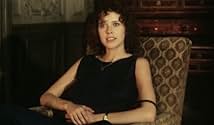IMDb RATING
6.6/10
1.4K
YOUR RATING
Alice leaves husband, car breaks down, spends night at manor. Next day car fixed but owners missing, she's trapped in walled estate, increasingly worried by strange discoveries.Alice leaves husband, car breaks down, spends night at manor. Next day car fixed but owners missing, she's trapped in walled estate, increasingly worried by strange discoveries.Alice leaves husband, car breaks down, spends night at manor. Next day car fixed but owners missing, she's trapped in walled estate, increasingly worried by strange discoveries.
- Director
- Writers
- Stars
- Awards
- 1 nomination total
Jean Le Boulbar
- Le Premier Homme
- (as Jean le Boulbar)
- Director
- Writers
- All cast & crew
- Production, box office & more at IMDbPro
Featured reviews
I expected a film with a protagonist named "Alice Carroll" to have something to do with Lewis Carroll's Alice books, but Claude Chabrol's "Alice or the Last Escapade" (although it seems a mistranslation to me to go from "fugue" to "escapade") reminds me more of Luis Buñuel's "The Exterminating Angel" (1962) and seems to have more in common with a different book, which this film's Alice reads in one scene, Jorge Luis Borges's "Fictions." That would explain the quasi-surrealism, labyrinth and purgatory-like entrapment and genre elements closer to horror than to the fairy tales of Carroll. Besides the one character's name, I didn't see much here beyond a checkered floor pattern or a somewhat small door and a generally strange place and characters suggesting that the film took inspiration from the Alice books. It's not an especially egregious bait-and-switch in this regard, although it's a travesty to cite Alice for a film that also reads largely as a reactionary revenge fantasy on the era's politics of second-wave feminism.
Allow me to elaborate. The picture begins with the male gaze (the concept of the "male gaze," itself, being a product of feminist film theory of the same era as this film--within a couple years, in fact, as Laura Mulvey penned her essay "Visual Pleasure and Narrative Cinema" in 1975), as Alice's beau is watching TV. While doing so, he calls upon Alice to listen to him complain about his day. Fed up with this male-centric gaze and storytelling, she announces that she's leaving him. He assumes she's being hysterical (a more accurate reading of the "fugue" in the title, I suspect, with all the misogynistic connotations of diagnosing women "hysterical") and warns her against leaving that night. Undeterred, Alice drives off on her own escapade, but her being a female driver in a man's movie, she soon crashes the car. A film-within-the-film of her emotional reflections is even played out on the windshield before the glass is broken--suggesting the incident has more to do with the emotional storm inside her than with the rainy weather outside.
Alice takes shelter in a mansion in what turns out to be something of a twist on the haunted, old-dark-house formula. The strange men she meets here inform her that she's trapped there and that her state of affairs is a source of amusement for them. In other words, she's found herself the subject of the male gaze, of which she cannot escape. She's confined in a film, with the mansion its theatre. This is, perhaps, most striking in a sequence that would otherwise seem to be a display of gratuitous nudity, as Alice stands seemingly alone in her room with a disembodied voice speaking to her. She tries to cover herself from an unseen gaze. Who's subjugating her with this voyeurism? We, the spectator, are.
This is such a well-constructed bit of reflexive composition centered on the cinematographic apparatus--its gaze and, thus, our gaze. It makes for a more engaging picture than the questionable ideology and trite sexism displayed would otherwise deserve.
Allow me to elaborate. The picture begins with the male gaze (the concept of the "male gaze," itself, being a product of feminist film theory of the same era as this film--within a couple years, in fact, as Laura Mulvey penned her essay "Visual Pleasure and Narrative Cinema" in 1975), as Alice's beau is watching TV. While doing so, he calls upon Alice to listen to him complain about his day. Fed up with this male-centric gaze and storytelling, she announces that she's leaving him. He assumes she's being hysterical (a more accurate reading of the "fugue" in the title, I suspect, with all the misogynistic connotations of diagnosing women "hysterical") and warns her against leaving that night. Undeterred, Alice drives off on her own escapade, but her being a female driver in a man's movie, she soon crashes the car. A film-within-the-film of her emotional reflections is even played out on the windshield before the glass is broken--suggesting the incident has more to do with the emotional storm inside her than with the rainy weather outside.
Alice takes shelter in a mansion in what turns out to be something of a twist on the haunted, old-dark-house formula. The strange men she meets here inform her that she's trapped there and that her state of affairs is a source of amusement for them. In other words, she's found herself the subject of the male gaze, of which she cannot escape. She's confined in a film, with the mansion its theatre. This is, perhaps, most striking in a sequence that would otherwise seem to be a display of gratuitous nudity, as Alice stands seemingly alone in her room with a disembodied voice speaking to her. She tries to cover herself from an unseen gaze. Who's subjugating her with this voyeurism? We, the spectator, are.
This is such a well-constructed bit of reflexive composition centered on the cinematographic apparatus--its gaze and, thus, our gaze. It makes for a more engaging picture than the questionable ideology and trite sexism displayed would otherwise deserve.
Alice Carol (Sylvia Kristel) leaves her husband (Bernard Rousselet) in a rainy night telling that she does not like him anymore. She travels alone but when her car breaks the windshield in a lonely road, she crosses the gate of a creepy manor and is welcomed by the owner Henri Vergennes (Charles Vanel) and his butler Colas (Jean Carmet) that invite Alice to spend the night in the house. On the next morning, Alice does not meet the two men and finds the windshield of her car surprisingly fixed. She tries to leave the real estate but does not find the gate. She stops the car and walks around the wall trying to find an exit. Soon she finds that she is trapped and cannot leave the property.
"Alice ou la Dernière Fugue" is an intriguing unknown masterpiece written and directed by Claude Charbrol and supported basically by the wonderful performance of the gorgeous Sylvia Kristel. The story is developed in a nightmarish atmosphere and the name of the lead character "Alice Carol" seems to be a tribute to "Alice in the Wonderland" of Lewis Carroll. Further, Adrian Lyne's "Jacob's Ladder" is visibly inspired in the storyline of this film. The mystery is kept until the very last scene. My vote is nine.
Title (Brazil): "Alice"
Note: On 17 November 2024, I saw this film again.
"Alice ou la Dernière Fugue" is an intriguing unknown masterpiece written and directed by Claude Charbrol and supported basically by the wonderful performance of the gorgeous Sylvia Kristel. The story is developed in a nightmarish atmosphere and the name of the lead character "Alice Carol" seems to be a tribute to "Alice in the Wonderland" of Lewis Carroll. Further, Adrian Lyne's "Jacob's Ladder" is visibly inspired in the storyline of this film. The mystery is kept until the very last scene. My vote is nine.
Title (Brazil): "Alice"
Note: On 17 November 2024, I saw this film again.
10bogdank
A brilliant movie. I liked it because all the time everything seemed so possible, but strange until the very end where you're shocked finding out what was really going on. It gets you to think about so many things related to life, dreams, and death.
In my view this is one of the best Chabrol's movies. Unfortunately, it did not get as much attention as the others.
Sylvia Kristel was good in her role. She has actually shown she could act.
In my view this is one of the best Chabrol's movies. Unfortunately, it did not get as much attention as the others.
Sylvia Kristel was good in her role. She has actually shown she could act.
Saw this by chance late one evening.
Was attracted by the ambiance, which I found very Tarkovsky-esque, before I was attracted by Sylvia Kristel (she was not on screen during the first minutes I saw ;-)
Was surprised to see her act. Really loved the pace and the suspense. Found the conclusion wonderful, though-provoking, unexpected.
In my view this is clearly in the top 10 percent of Chabrol's production. I don't understand why this film is not well-known - maybe because it has an ex-erotic film actress in it?
A very good surprise.
Was attracted by the ambiance, which I found very Tarkovsky-esque, before I was attracted by Sylvia Kristel (she was not on screen during the first minutes I saw ;-)
Was surprised to see her act. Really loved the pace and the suspense. Found the conclusion wonderful, though-provoking, unexpected.
In my view this is clearly in the top 10 percent of Chabrol's production. I don't understand why this film is not well-known - maybe because it has an ex-erotic film actress in it?
A very good surprise.
I saw this movie on TV when I was 11 years old and it had a deep impression on me. Watching it again, I can identify many elements which are (and already were in the 1976) very conventional, or even outdated: the existentialist/ nouveau roman-plot, the Margritte-aesthetics, the "Psycho"-allusions...
The portrait of Alice (Kristel, sensuous as ever) and of her fate is sometimes of a certain merciless quality (misogynous tendencies?), but this movie is emulating the scenario of a real "cauchemare" far better than any other "Splatter" or "Horror"-Movie.
The portrait of Alice (Kristel, sensuous as ever) and of her fate is sometimes of a certain merciless quality (misogynous tendencies?), but this movie is emulating the scenario of a real "cauchemare" far better than any other "Splatter" or "Horror"-Movie.
Did you know
- TriviaSylvia Kristel said in a 1981 interview that she feels this movie bombed because she only had one nude scene. She said "For some reason the roles in which I keep my clothes on never become successful movies."
- ConnectionsFeatures Des chiffres et des lettres (1972)
- SoundtracksLe 24ème concerto en ut mineur
by Wolfgang Amadeus Mozart (as Mozart)
Performed on piano by Paul Von Schilhawski
Conducted by Rudolf Albert
Disque MUSIDISC.
- How long is Alice or The Last Escapade?Powered by Alexa
Details
- Release date
- Country of origin
- Language
- Also known as
- Аліса, або остання втеча
- Filming locations
- Chateau des Migneaux, Villennes sur Seine, France(Mansion of Henri Vergennes)
- Production companies
- See more company credits at IMDbPro
- Runtime
- 1h 33m(93 min)
- Sound mix
- Aspect ratio
- 1.66 : 1
Contribute to this page
Suggest an edit or add missing content

